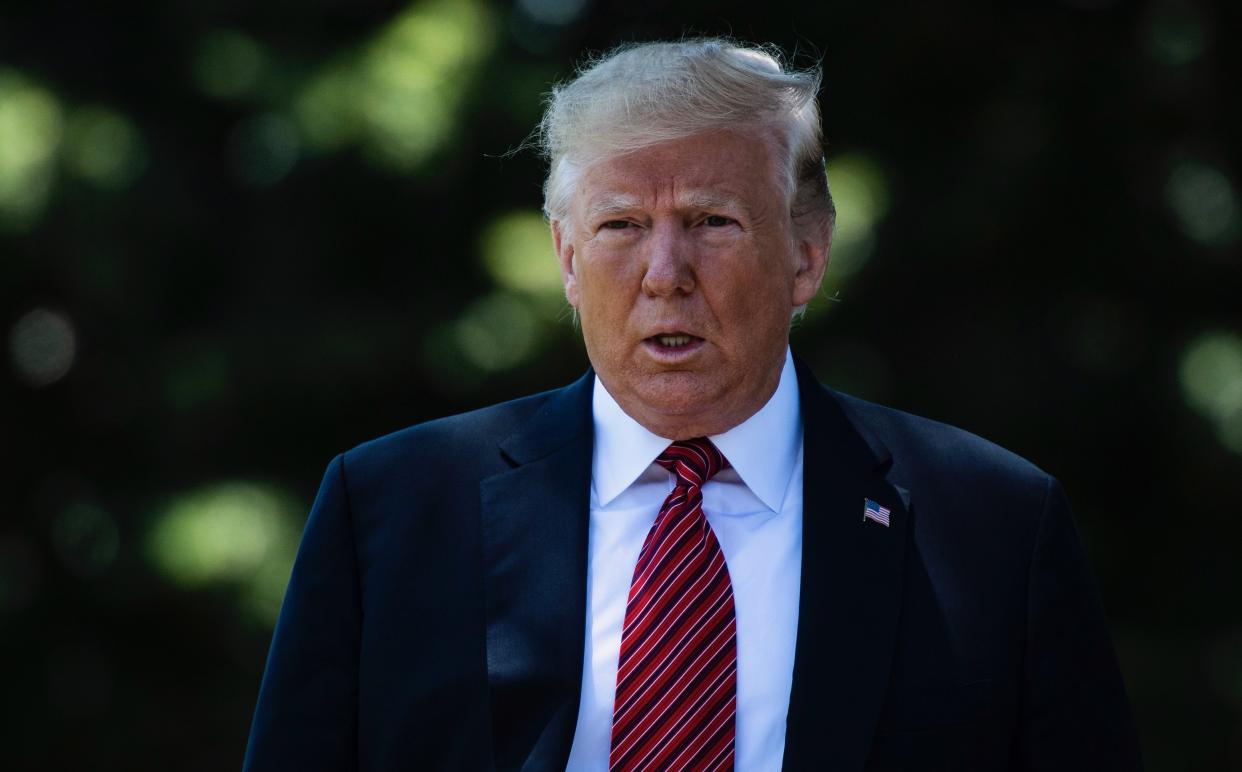Donald Trump talks USWNT's 'big win,' punts on pay gap question: 'We'll talk about that later'
The U.S. women’s national team’s historic 13-0 win over Thailand to open World Cup play on Tuesday sparked some heated debates.
Should they have run up the score? Should they have celebrated while doing so? If so, how much?
It also put back in the spotlight a gender discrimination lawsuit the team filed in March against the U.S. Soccer Federation demanding equal pay to the men’s national team.
The debate raged on Twitter and quickly reached the world of politics as women’s issues maintain a prominent place on the campaign trail in the lead-up to the 2020 elections.

Donald Trump asked about equal pay for USWNT
President Donald Trump faced the issue on Wednesday.
NBC’s Peter Alexander posed Trump with a question about the team’s performance against Thailand.
“Big win,” Trump said.
When Alexander followed up by asking if the women’s team should get paid the same as the men, Trump remained curt.
“We’ll talk about that later,” Trump responded.
It was an astute political dodge on a hot-button topic that dominated social media discussions on Tuesday. Some politicians have chosen to take a firmer stance.
Other politicians’ responses
Democratic presidential candidate Senator Kirsten Gillibrand made clear her stance shortly after the victory.
Here's an idea: If you win 13-0—the most goals for a single game in World Cup history—you should be paid at least equally to the men's team.
Congratulations, #USWNT!— Kirsten Gillibrand (@SenGillibrand) June 11, 2019
Former republican U.S. Senator from Utah Orrin Hatch joined Gillibrand on Wednesday in calling for equal pay.
Of course Hatch is retired from the political scene and has nothing to lose on that front. Among other battles, Trump is fighting to secure a second term in office.
Trump’s record on women’s issues
Trump’s personal and political track record is not one of championing women’s causes. He’s nominated two pro-life Supreme Court justices in Neil Gorsuch and Brett Kavanaugh, helping in part to set up a high-stakes political battle that’s currently playing out in state legislatures to challenge Roe v. Wade.
He shuttered the White House Council on Women and Girls initiated by the Barack Obama administration. And he’s proposed cutting funding to Planned Parenthood.
And, of course, there are the multiple allegations of sexual misconduct against Trump.
He appeared to decide on Wednesday that a modified “no comment” was the prudent political play.

USWNT shifts focus to field
As for the U.S. women, they have put their legal battle on the back burner as they pursue a World Cup title. But their dominant showing Tuesday served to strengthen the case of supporters who argue that the women’s team should be on equal compensation footing as a men’s team that pales competitively.
The U.S. women have claimed three World Cup championships and are seeking their second straight after winning in 2015.
The U.S. men have never advanced past the semifinals — and that was in 1930. Since then, their best showing was a quarterfinal loss to Germany in 2002. They failed to qualify for the World Cup last year.
Not a simple issue
Of course equating on-field success with compensation makes for a complicated issue. An argument suggesting that Seattle Storm players who won the WNBA title last year should be paid more than Phoenix Suns or New York Knicks players is ludicrous when considering the economics of the two leagues.
The NBA is a revenue titan compared to the WNBA.
It’s the case the USSF maintained in its response to the lawsuit that argues that the women’s team is an independent entity from the men’s team and operate on a separate revenue stream.
But the women’s team and men’s team are not separate entities on the scale that NBA and WNBA teams are. The economics of both programs are wrapped under the same USSF umbrella, and arguments can be made that not only is the women’s team more successful than the men’s team, but also more popular.
Thanks in part to the two programs being so intertwined, there’s very little data to support the USSF’s claim that the men’s team generates more revenue that the women.
Success will only bolster USWNT’s case
So until — and likely after — the lawsuit is settled, the debate will rage on. Should the women’s team expect to be paid as much as the men’s team?
In the meantime, the U.S. women will continue to make their case on the field. The more success they have in this World Cup, the more support they’ll garner in their legal battle.
More from Yahoo Sports:
